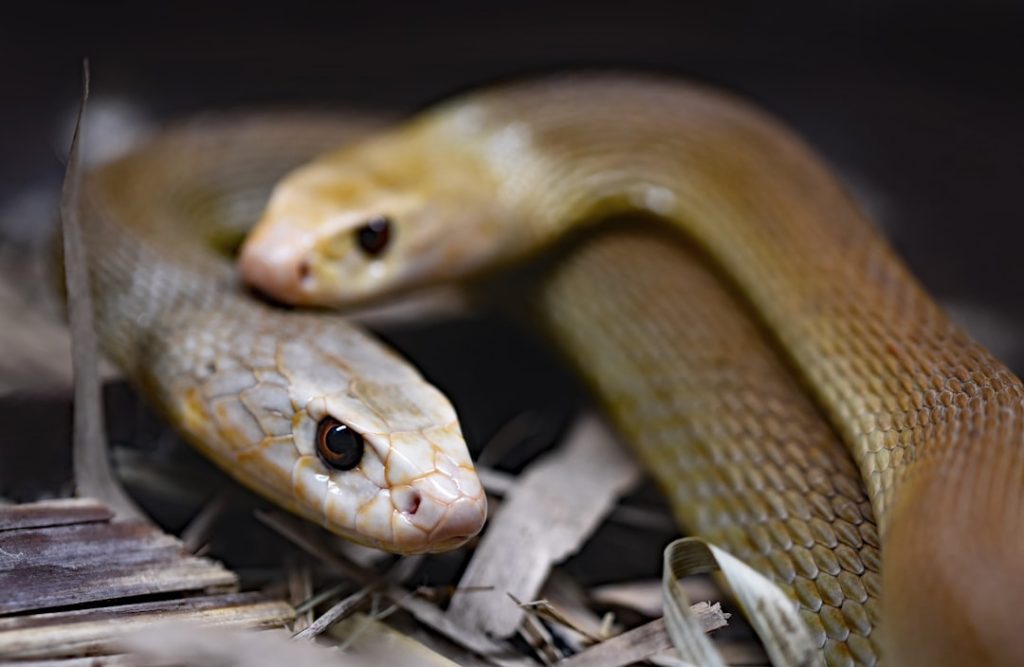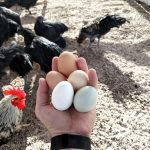Snakes pose a significant threat to chickens and their eggs. As natural predators, they are attracted to chicken coops and enclosures, easily accessing them due to their ability to navigate small spaces. Once inside, snakes can cause considerable damage by preying on chickens, consuming eggs, and inducing stress in the flock.
Some snake species are venomous, presenting additional risks to both chickens and humans. Understanding these dangers is crucial for implementing effective protective measures. Snakes are adept hunters capable of overpowering chickens, particularly young or smaller birds.
Their ability to swallow eggs whole makes them a persistent threat to egg production. Beyond direct predation, the presence of snakes can disrupt the flock’s social structure and induce stress, potentially impacting overall health and productivity. Chicken owners should be vigilant and proactive in safeguarding their flocks against these predators to ensure the well-being and productivity of their chickens.
Table of Contents
- 1 Creating a Snake-Proof Coop: Tips for Securing Your Chicken Enclosure
- 2 Natural Deterrents: Plants and Scents That Repel Snakes
- 3 Physical Barriers: How to Use Fencing and Netting to Keep Snakes Out
- 4 Predator Control: Attracting Natural Snake Predators to Your Property
- 5 Regular Maintenance: Steps to Take to Prevent Snake Infestations
- 6 What to Do If You Encounter a Snake: Safety Tips for Dealing with Snakes on Your Property
- 7 FAQs
- 7.1 What are some natural ways to keep snakes away from chickens?
- 7.2 What are some predator-proofing measures for chicken coops?
- 7.3 Are there any commercial products available to keep snakes away from chickens?
- 7.4 What should I do if I encounter a snake near my chicken coop?
- 7.5 Are all snakes a threat to chickens?
Key Takeaways
- Snakes pose a danger to chickens as they are natural predators and can easily enter chicken coops.
- Secure chicken enclosures by using hardware cloth, burying fencing, and sealing any gaps or openings.
- Planting marigolds, wormwood, and lavender can help repel snakes, as can using essential oils like cinnamon and clove.
- Use fencing with small gaps and netting to prevent snakes from entering the chicken coop.
- Attract natural snake predators like owls, hawks, and king snakes to help control the snake population on your property.
- Regularly inspect and maintain the chicken coop, removing any potential hiding spots for snakes.
- If you encounter a snake, keep a safe distance, do not provoke it, and contact a professional for removal if necessary.
Creating a Snake-Proof Coop: Tips for Securing Your Chicken Enclosure
Sealing Entry Points
Start by inspecting your coop for any potential entry points that snakes could use to gain access. Seal any gaps or holes in the coop with hardware cloth or wire mesh to prevent snakes from slithering in.
Raising the Coop and Preventing Burrowing
It’s also important to ensure that the coop is raised off the ground, as snakes are less likely to climb up into a raised coop. Additionally, consider installing a skirt of hardware cloth around the perimeter of the coop to prevent snakes from burrowing underneath.
Maintaining a Snake-Free Zone
Another important step in creating a snake-proof coop is to keep the area around the coop free of debris and clutter. Remove any piles of wood, rocks, or other materials that could provide hiding spots for snakes. Keep the grass and vegetation around the coop trimmed short to eliminate potential hiding spots for snakes. Consider using gravel or mulch around the perimeter of the coop instead of grass, as snakes are less likely to slither across these surfaces.
Natural Deterrents: Plants and Scents That Repel Snakes

There are several plants and scents that are known to repel snakes and can be used as natural deterrents around your chicken coop. Some plants, such as marigolds, lemongrass, and wormwood, are known for their ability to repel snakes due to their strong scents. Planting these around the perimeter of your coop can help deter snakes from approaching.
Additionally, essential oils such as cinnamon, clove, and cedarwood are known to have a repellent effect on snakes. You can create a natural snake repellent spray by mixing these essential oils with water and spraying it around the coop. Another natural deterrent for snakes is the use of predator urine.
Predator urine, such as that from foxes or coyotes, can be purchased and used to create a perimeter around the coop. The scent of predator urine can deter snakes from approaching the area, as they will perceive it as a potential threat. Using natural deterrents such as plants, essential oils, and predator urine can help keep snakes away from your chicken coop without the use of harmful chemicals.
Physical Barriers: How to Use Fencing and Netting to Keep Snakes Out
Using physical barriers such as fencing and netting is an effective way to keep snakes out of your chicken coop. Install a sturdy wire mesh fence around the perimeter of the coop to prevent snakes from slithering in. Make sure the fence is buried at least 6 inches into the ground to prevent snakes from burrowing underneath.
Additionally, consider adding an outward-facing overhang at the top of the fence to prevent snakes from climbing over. In addition to fencing, consider using netting or mesh covers over windows and vents in the coop to prevent snakes from entering through these openings. Make sure that any openings in the coop are covered with fine mesh that snakes cannot penetrate.
Regularly inspect the fencing and netting for any signs of damage or wear and tear, and make repairs as needed to ensure that your coop remains snake-proof.
Predator Control: Attracting Natural Snake Predators to Your Property
Attracting natural snake predators to your property can help control the snake population and reduce the risk of infestations around your chicken coop. Some natural snake predators include birds of prey such as hawks and owls, as well as certain species of snakes such as king snakes and rat snakes. You can attract these predators to your property by providing suitable habitat and food sources.
For example, installing perches or nesting boxes for birds of prey can encourage them to frequent your property. In addition to attracting natural predators, you can also consider introducing non-venomous snake species such as king snakes to your property. King snakes are known for their ability to prey on other snake species, including venomous ones.
By introducing king snakes to your property, you can help control the snake population and reduce the risk of infestations around your chicken coop. However, it’s important to consult with local wildlife authorities before introducing any non-native species to your property.
Regular Maintenance: Steps to Take to Prevent Snake Infestations

Clear the Area Around the Coop
Keep the area around the coop free of clutter and debris, as these can provide hiding spots for snakes. Regularly inspect the perimeter of the coop for any signs of damage or potential entry points for snakes, and make repairs as needed.
Maintain a Snake-Free Environment
Keep the grass and vegetation around the coop trimmed short to eliminate potential hiding spots for snakes.
Control the Rodent Population
In addition to regular maintenance of the coop itself, it’s important to also take steps to control the rodent population on your property. Rodents are a common food source for snakes, so reducing their numbers can help deter snakes from approaching your chicken coop. Use traps or other rodent control methods to keep the population in check and reduce the risk of attracting snakes to your property.
What to Do If You Encounter a Snake: Safety Tips for Dealing with Snakes on Your Property
If you encounter a snake on your property, it’s important to approach it with caution and take appropriate safety measures. Keep a safe distance from the snake and avoid making sudden movements that could startle it. If you need to remove a snake from your property, consider contacting a professional wildlife removal service for assistance.
It’s important to remember that not all snakes are venomous, but it’s best to err on the side of caution when dealing with them. If you are unsure about the species of snake you have encountered, it’s best to assume that it is venomous and take appropriate safety precautions. Avoid attempting to handle or capture the snake yourself, as this can be dangerous and should be left to trained professionals.
In conclusion, snakes pose a significant threat to chickens and their eggs, but there are several proactive measures that chicken owners can take to protect their flock from these predators. By understanding the potential danger that snakes pose, creating a snake-proof coop, using natural deterrents, implementing physical barriers, attracting natural predators, regular maintenance, and taking appropriate safety measures when encountering a snake on your property, you can effectively prevent snake infestations and keep your chickens safe and secure.
If you’re looking for ways to keep snakes away from your chickens, you may want to check out this article on poultrywizard.com. It offers tips on how to design the floor of your chicken coop to prevent snakes from entering and harming your flock. This can be a helpful resource for chicken owners who want to ensure the safety and well-being of their birds.
FAQs
What are some natural ways to keep snakes away from chickens?
Some natural ways to keep snakes away from chickens include keeping the coop area clean and free of debris, using strong-smelling plants like garlic and marigolds, and installing snake-proof fencing around the coop.
What are some predator-proofing measures for chicken coops?
Some predator-proofing measures for chicken coops include using hardware cloth instead of chicken wire, securing all openings with locks or latches, and installing motion-activated lights or sound devices to deter predators.
Are there any commercial products available to keep snakes away from chickens?
Yes, there are commercial products available such as snake repellent sprays and electronic snake deterrents that emit vibrations or sound to keep snakes away from chicken coops.
What should I do if I encounter a snake near my chicken coop?
If you encounter a snake near your chicken coop, it’s best to keep a safe distance and call a professional wildlife removal service to safely and humanely remove the snake from your property.
Are all snakes a threat to chickens?
While not all snakes are a threat to chickens, some species such as rat snakes, racers, and king snakes may pose a risk to chicken coops as they are known to prey on small animals and eggs. It’s important to be cautious and take preventive measures regardless of the snake species.
Meet Walter, the feathered-friend fanatic of Florida! Nestled in the sunshine state, Walter struts through life with his feathered companions, clucking his way to happiness. With a coop that’s fancier than a five-star hotel, he’s the Don Juan of the chicken world. When he’s not teaching his hens to do the cha-cha, you’ll find him in a heated debate with his prized rooster, Sir Clucks-a-Lot. Walter’s poultry passion is no yolk; he’s the sunny-side-up guy you never knew you needed in your flock of friends!







